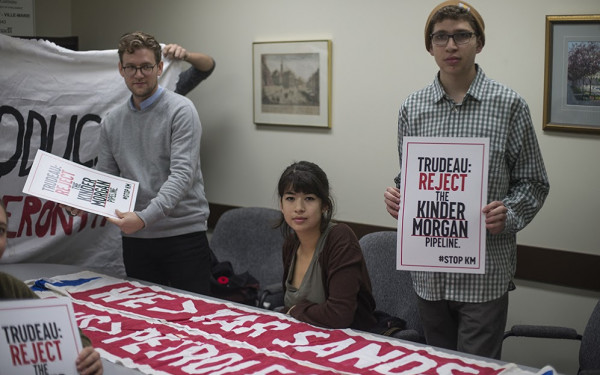Editorial: Support Indigenous Resistance to the Tar Sands
Since the beginning of the Idle No More movement in 2012, Canada has seen a coast-to-coast resurgence of Indigenous resistance to environmentally destructive resource extraction.
This explosion of Indigenous organizing took a new, and highly significant, turn on Thursday.
Approximately 80 First Nations have signed a treaty alliance in opposition to the expansion of Alberta’s Tar Sands—the largest and most destructive industrial project on earth—and any associated infrastructure, such as pipelines, tankers, and ports.
This treaty, which will become a legally binding document within signatory nations, is a more coordinated approach which follows the mutual-defense formula of “an attack on one is an attack on all”—meaning that if oil companies attempt to pass pipelines or other oil infrastructure in the traditional lands of one nation, all other signatories will react as a collective whole in order to prevent this from happening.
It’s difficult to overstate the potential significance of this treaty. For over a decade, the expansion of the Tar Sands has been the defining aspect of the Canadian economy. It has also been a disaster for Indigenous communities around the extraction site—downstream communities such as the Athabasca Chipewyan First Nation have seen an outburst in rare cancer rates since the extraction began to expand. Twenty-three cases of cancer were discovered in 94 participants of a study.
Tar Sands expansion has led to the destruction of traditional ways of life for surrounding Indigenous communities. The lack of consent by First Nations—whose territory is being ripped up by the oil extraction—situates the Tar Sands squarely within Canada’s shameful legacy of colonialism and systemic racism.
Beyond issues of Indigenous rights, the Tar Sands are also an environmental disaster. James Hansen, one of the world’s leading climate scientists, has repeatedly called Tar Sands exploitation “game over” for the climate. If Canada is serious about living up to the promises it made in the 2015 Paris Accords on climate change, then continued exploitation—let alone expansion—of the Tar Sands is not an option. The desire to push through pipelines and Tar Sands infrastructure by the Liberal government is in direct contradiction with its stated goals of an effective response to climate change.
The actions we choose to take—or not take—to stop the Tar Sands will be among the defining characteristics of our generation.
The supremacy of the Tar Sands in the Canadian economy is often associated with the Harper government, which was swept from power by Justin Trudeau’s Liberals in the 2015 federal election. Trudeau, as part of his electoral platform, made significant promises to Indigenous people to restore relations that had been strained under the Conservatives.
Since taking power, the Liberals have adopted alternative measures, and have dismissed many of the progressive promises that defined their campaign. Despite his numerous photo-ops wearing Indigenous regalia, Trudeau’s administration has abandoned a key campaign promise to First Nations—to adopt and respect the United Nations Declaration on the Rights of Indigenous People.
The UNDRIP is a document which, among other important aspects, gives Indigenous peoples the right to veto any project which passes through traditional land and could affect their way of life. This power—to influence the direction that development takes—is a long-sought demand by Indigenous peoples in Canada.
Jody Wilson-Raybould, Justice Minister of the Trudeau administration—and a member of the Kwakwaka’wakw First Nation—has said that the UNDRIP is “unworkable” and dubbed it a “political distraction.”
The signing of this treaty may be a sign that Indigenous people are taking matters into their own hands, and asserting their rights rather than waiting for the federal government to grant them. This shift is undoubtedly a sign of growing confidence by the original inhabitants of this land to assert themselves. The Link welcomes and encourages this development.
This treaty, beyond its significance in the present, may also be a sign of things to come in the future. Indigenous unification on this scale is unprecedented, and is hopefully a sign of a broader process of genuine decolonization.
The Link stands in solidarity with Indigenous communities, and against the development of the Tar Sands. As the descendents of settlers, we recognize that in order to break the cycle of colonial injustice against Indigenous peoples we must allow for First Nations to have a real voice.
When Indigenous communities say “no,” their refusal should be final. The Canadian government must respect this basic tenet of consent. If consent is not respected—with this treaty signed—Trudeau is going to have a serious fight on his hands. And in this fight, The Link is proud to stand with Indigenous peoples.





_600_375_90_s_c1.jpg)

